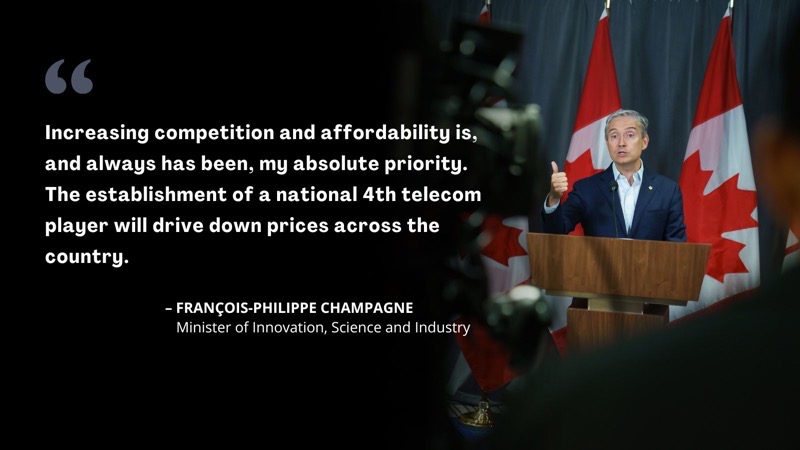
Rogers-Shaw Merger Approved by Minister, Decision Blasted by Critics

Minister of Innovation, Science and Industry, François-Philippe Champagne, Minister of Innovation, Science and Industry, announced on Friday morning he has approved the Rogers-Shaw merger, to nobody’s surprise.
“Today, I am informing Canadians that I have secured on their behalf unprecedent and legally binding commitments from Rogers and Videotron. And, after imposing strict conditions, the spectrum licences of Freedom Mobile will be transferred to Videotron,” said Champagne at a press conference.
OpenMedia Executive Director Laura Tribe, blasted the decision, saying “Minister Champagne has turned his back on Canadians, and has crowned Rogers the effective ‘king’ of Canada’s internet – the single largest company in our already overly centralized market.”
“It’s hard to reconcile this week’s federal budget filled with promises of affordability measures, with such a direct assault on choice and affordability for Internet connectivity,” added Tribe.
Did Canada make the right choice in approving the Rogers-Shaw merger?
— iPhone in Canada (@iPhoneinCanada) March 31, 2023
Champagne emphasized that a strong fourth competitor can lead to lower prices, as demonstrated in Atlantic provinces, Quebec, Ontario, Alberta, and British Columbia. The agreements and conditions imposed on the parties will ensure that the new fourth player is “in it for the long haul” and can compete with the big three companies.
“Videotron will offer plans that are comparable to those currently available in Quebec, and offer options at least 20% cheaper than those made available by the major players,” proclaimed Champagne.
In addition, Videotron cannot transfer the Freedom Mobile licences for ten years, must expand its 5G wireless network in Freedom Mobile’s pre-existing operating territory within two years, expand mobile service into Manitoba, and increase data allotments of existing Freedom Mobile customers by 10%.
Rogers will also be subject to strict and legally binding commitments, including creating 3,000 new jobs in Western Canada and investing $1 billion to expand broadband Internet access and 5G mobile service in areas where it is not currently available. They will also expand access to low-cost broadband Internet plans and launch a new low-cost mobile offering for low-income Canadians.
“These agreements are subject to significant financial damages for non-compliance: up to $200 million in the case of Videotron and up to $1 billion in the case of Rogers,” said Champagne. The agreements will be released publicly and are subject to annual reporting requirements.
Videotron and Rogers have also entered into commercial network-access agreements, including an MVNO and Domestic Roaming Agreement, on terms that will help Videotron compete more effectively as it expands in other regions of Canada.
“As part of my decision today, I am also announcing a moratorium on large scale spectrum transfers and directing my Department to launch a comprehensive review of Canada’s spectrum transfer framework – something which has not been done in almost a decade,” touted Champagne.
If Canadians do not see a “clear and meaningful reduction in prices within a reasonable amount of time,” the minister warned that he will use further legislative and regulatory powers to drive down prices.
“Canadians rightfully expect and deserve more from their telecom sector. We will continue to ensure the industry meets these standards, including improving competition, reliability and affordability,” he concluded in his announcement, a master class at gaslighting Canadians.
Rogers, Shaw, Quebecor to Expedite Closing of Deal
After the decision was made, Rogers, Shaw, and Quebecor issued a joint release to say they plan to close the pro-competitive transactions “expeditiously” after receiving approval from the federal government.
“We are very pleased to move forward with this transformative merger and proudly deliver on our commitments to enhance and expand network coverage, connect underserved communities, and improve access for low-income Canadians,” said Tony Staffieri, President and CEO, Rogers, in a statement. “Building on a shared legacy with Shaw, we will invest substantially to bring more choice, more value, and more connectivity to Canadians across the country.”
“Today begins an exciting new chapter for the future of connectivity in Canada,” said Brad Shaw, Executive Chair and CEO, Shaw in a statement. “In today’s telecommunications industry, we recognize that companies need even greater scale to compete and make ongoing investments for future technology. This merger will provide the scale necessary for the future success and competitiveness of the wireline business that Shaw has built over the past five decades.”
Shortly afterwards, Rogers issued revised fiscal guidance for 2023, noting it expects a 26-30% increase in total service revenues with Shaw now secured.
TekSavvy, Globalive, The Public Interest Advocacy Centre (PIAC) Blast Decision
Vice-President of Insight & Engagement at TekSavvy, Peter Nowak, said “The fact that the government approved a merger that would have been the easiest, most popular slam dunk imaginable is very worrisome. Is there anything they won’t do for these companies?”.
The fact that the government approved a merger that would have been the easiest, most popular slam dunk imaginable is very worrisome. Is there anything they won't do for these companies?
— Peter Nowak (@peternowak) March 31, 2023
Simon Lockie, Chief Legal Officer of Globalive Capital that tried to buy Shaw, responded by saying “This was a huge missed opportunity to give Canada what it desperately needs, which is a truly independent pureplay wireless operator. A bunch of meaningless undertakings will ensure Canadians keep paying the highest wireless prices globally. Very disappointing day for consumers.”
This was a huge missed opportunity to give Canada what it desperately needs, which is a truly independent pureplay wireless operator. A bunch of meaningless undertakings will ensure Canadians keep paying the highest wireless prices globally. Very disappointing day for consumers.
— Simon Lockie (@LockieSimon) March 31, 2023
“The promise is a ‘new national fourth player’ wireless company and lower prices for cellphone service – this is smoke and mirrors,” said John Lawford, Executive Director and General Counsel at PIAC, in response to the Rogers-Shaw merger.
“We do not believe the conditions obtained by the Minister can counteract the anti-competitive effects of this merger on Canadians, and will lead to another decade of high wireless prices for Canadians,” he added.
The Canadian Anti-Monopoly Project (CAMP) was also disappointed in the federal government’s decision.
“Minister Champagne’s approval closes the book on the two year Rogers-Shaw saga, leaving Canadians with one less telecommunications provider and the future of wireless competition uncertain,” said Keldon Bester, CAMP co-founder, in a statement.
“Though the Minister’s commitments and penalties are a positive step, our laws have once again traded away actually existing competition for the promise of a new competitor, handpicked by a dominant incumbent. Canada must act quickly to reform our permissive approach to these harmful mergers to prevent this from ever happening again,” said Bester.
…developing, more to follow

